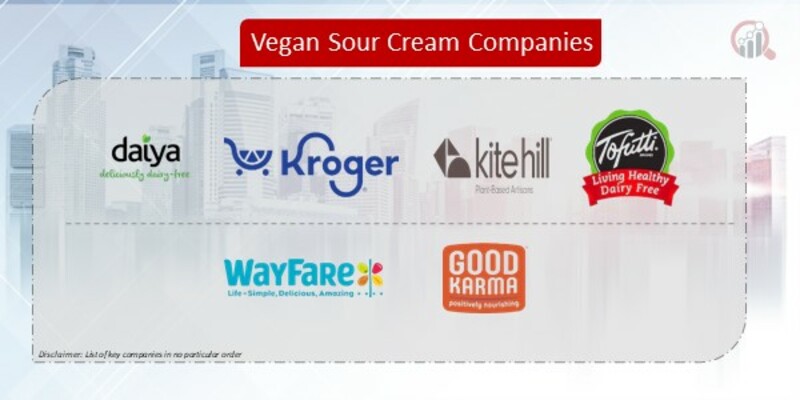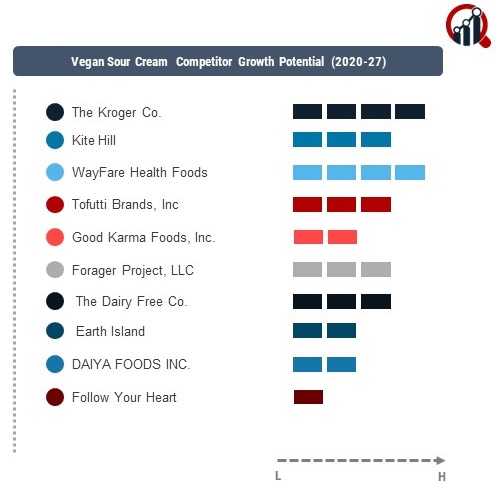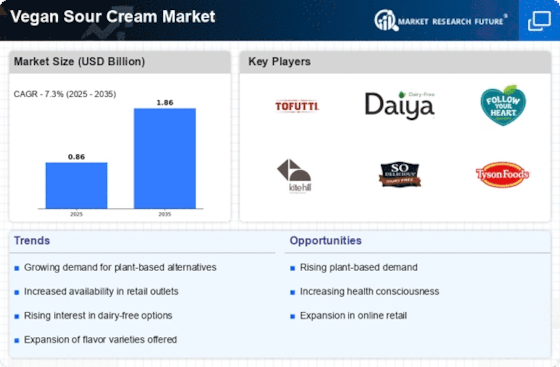Top Industry Leaders in the Vegan Sour Cream Market

Strategies Adopted by Vegan Sour Cream Key Players
The Vegan Sour Cream market is witnessing robust growth as consumers increasingly embrace plant-based alternatives. This analysis delves into the key players, strategies employed, market share dynamics, emerging companies, industry trends, current investment patterns, the overall competitive scenario, and a notable development in 2023.
Key Players:
The Kroger Co. (US)
Kite Hill (US)
WayFare Health Foods (US)
Tofutti Brands, Inc (US)
Good Karma Foods, Inc. (US)
Forager Project, LLC (US)
The Dairy Free Co. (US)
Earth Island (Canada)
DAIYA FOODS INC. (Canada)
Follow Your Heart (US)
Strategic initiatives are pivotal for success in the competitive Vegan Sour Cream market. Key players focus on product innovation to meet the evolving preferences of consumers. This involves introducing new flavors, textures, and formulations to replicate the taste and functionality of traditional dairy-based sour cream.
Supply chain optimization is a critical strategy adopted by market leaders. Efficient sourcing of plant-based ingredients and streamlined manufacturing processes contribute to ensuring a consistent and reliable supply of Vegan Sour Cream products. Strategic collaborations with suppliers and distributors enhance the overall efficiency of the supply chain.
Marketing strategies revolve around brand promotion and consumer education. Companies invest in advertising campaigns to create brand awareness and highlight the benefits of their vegan sour cream, such as being dairy-free, lactose-free, and often lower in saturated fats. Digital marketing and social media are key channels for reaching the target audience.
Market Share Analysis:
Several factors influence market share dynamics in the Vegan Sour Cream market. Brand reputation is critical, with consumers often choosing products from companies with a history of delivering high-quality and reliable plant-based alternatives. Market leaders invest in maintaining and enhancing their brand image through consistent product quality.
Diversity in product offerings is a key factor for maintaining and expanding market share. Companies with a wide range of vegan sour cream products, catering to different dietary preferences (such as soy-free, nut-free, or gluten-free), can capture a larger share of the market by appealing to diverse consumer needs.
Strategic partnerships with retailers and foodservice providers are instrumental in enhancing market reach. Companies that secure prominent shelf space in retail outlets or form collaborations with popular foodservice chains can capitalize on increased visibility and accessibility, directly impacting market share.
News & Emerging Companies:
The Vegan Sour Cream market is characterized by continuous innovation and the emergence of new companies offering unique solutions. Industry news often highlights breakthroughs in plant-based ingredient sourcing, novel processing techniques, and expansions into new geographical markets.
Emerging companies in this space often focus on niche segments within the vegan sour cream category, such as fermented or probiotic-rich varieties. These companies leverage agility and a focus on specific consumer needs to carve out a niche for themselves in a market dominated by larger players.
Industry Trends:
The Vegan Sour Cream market reflect the industry's commitment to innovation, sustainability, and meeting the rising demand for plant-based alternatives. Research and development investments are directed towards enhancing the taste, texture, and nutritional profile of vegan sour cream.
Sustainability efforts include eco-friendly packaging solutions and sourcing practices. Many companies in this space align their operations with environmental responsibility, a key consideration for consumers seeking ethically produced and sustainable products.
Investments in technology aim to improve production efficiency. Automation and digitization in manufacturing facilities contribute to reducing operational costs and ensuring product consistency, both essential factors for meeting the growing demand for vegan sour cream.
Market expansion remains a key trend, with companies exploring opportunities in both traditional and emerging markets. Mergers and acquisitions are common, allowing companies to diversify their product portfolios and gain access to new distribution channels.
Competitive Scenario:
The Vegan Sour Cream market exhibits a competitive landscape characterized by the coexistence of established industry leaders and emerging players. Established companies leverage their experience, economies of scale, and strong brand equity to maintain dominance. However, the market's dynamism is fueled by innovative startups that challenge the status quo by introducing novel products and pioneering new trends.
The overall competitive scenario reflects the industry's responsiveness to changing consumer preferences and advancements in technology. Companies continually adapt their strategies to address evolving market dynamics, such as the increasing demand for high-quality, flavorful, and nutritionally rich vegan sour cream products.
Recent Development
The Vegan Sour Cream market was the widespread adoption of sustainable packaging practices. Major players invested in transitioning to eco-friendly packaging solutions, aligning with the growing consumer demand for environmentally responsible products. This development underscores the industry's commitment to reducing its environmental footprint and meeting the expectations of eco-conscious consumers.












